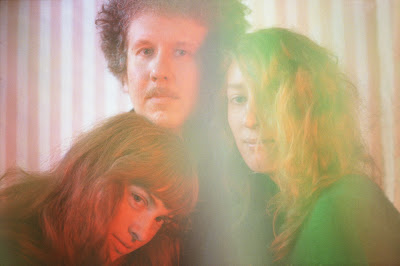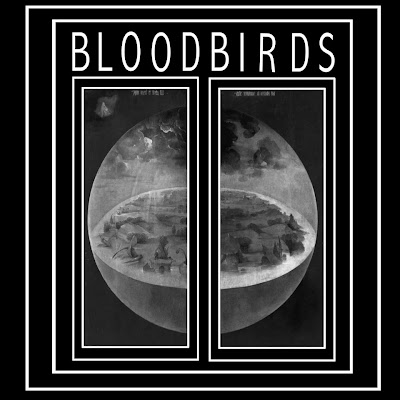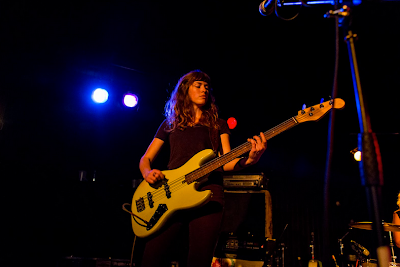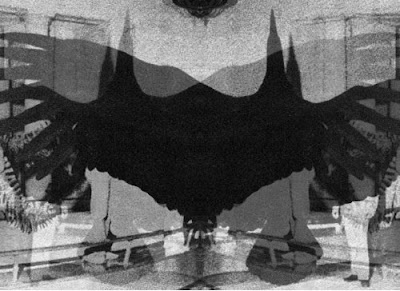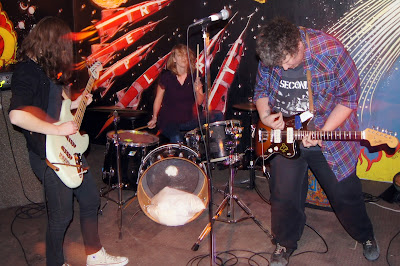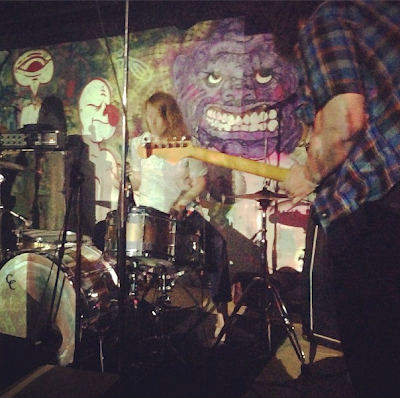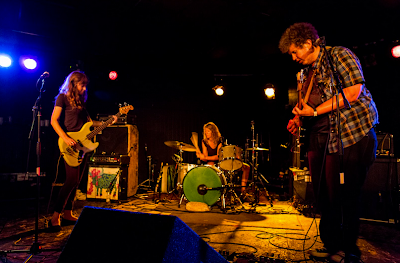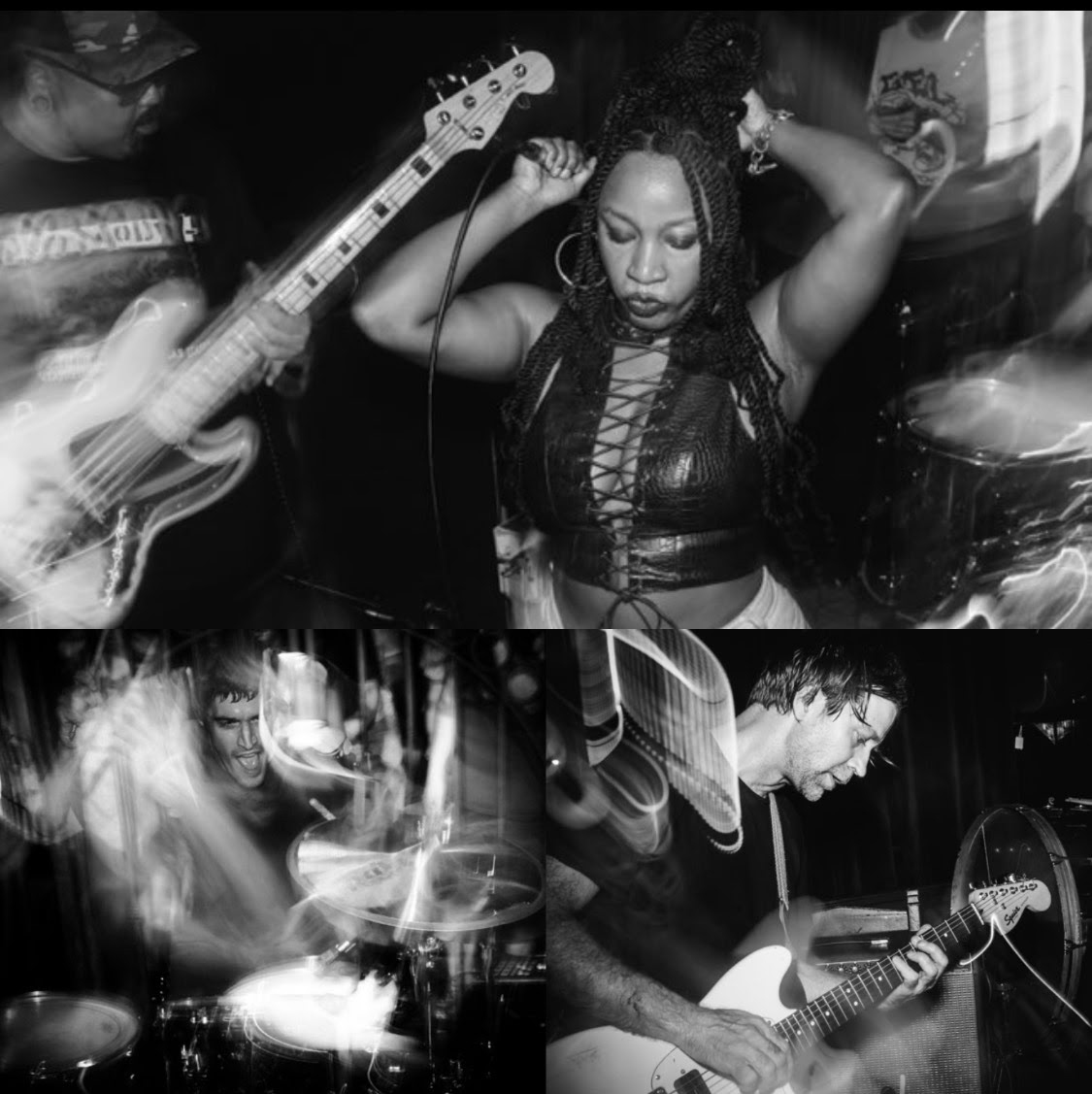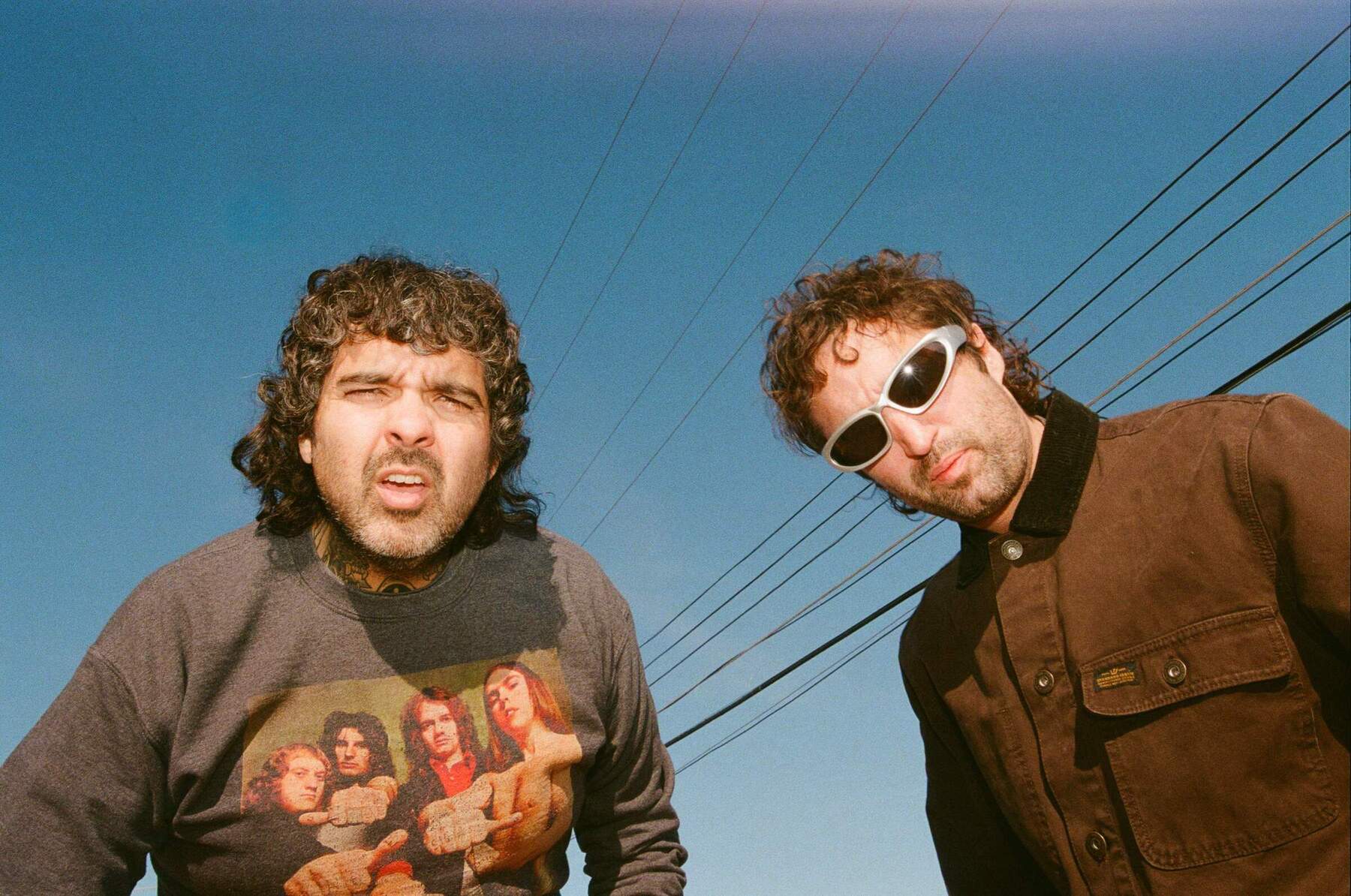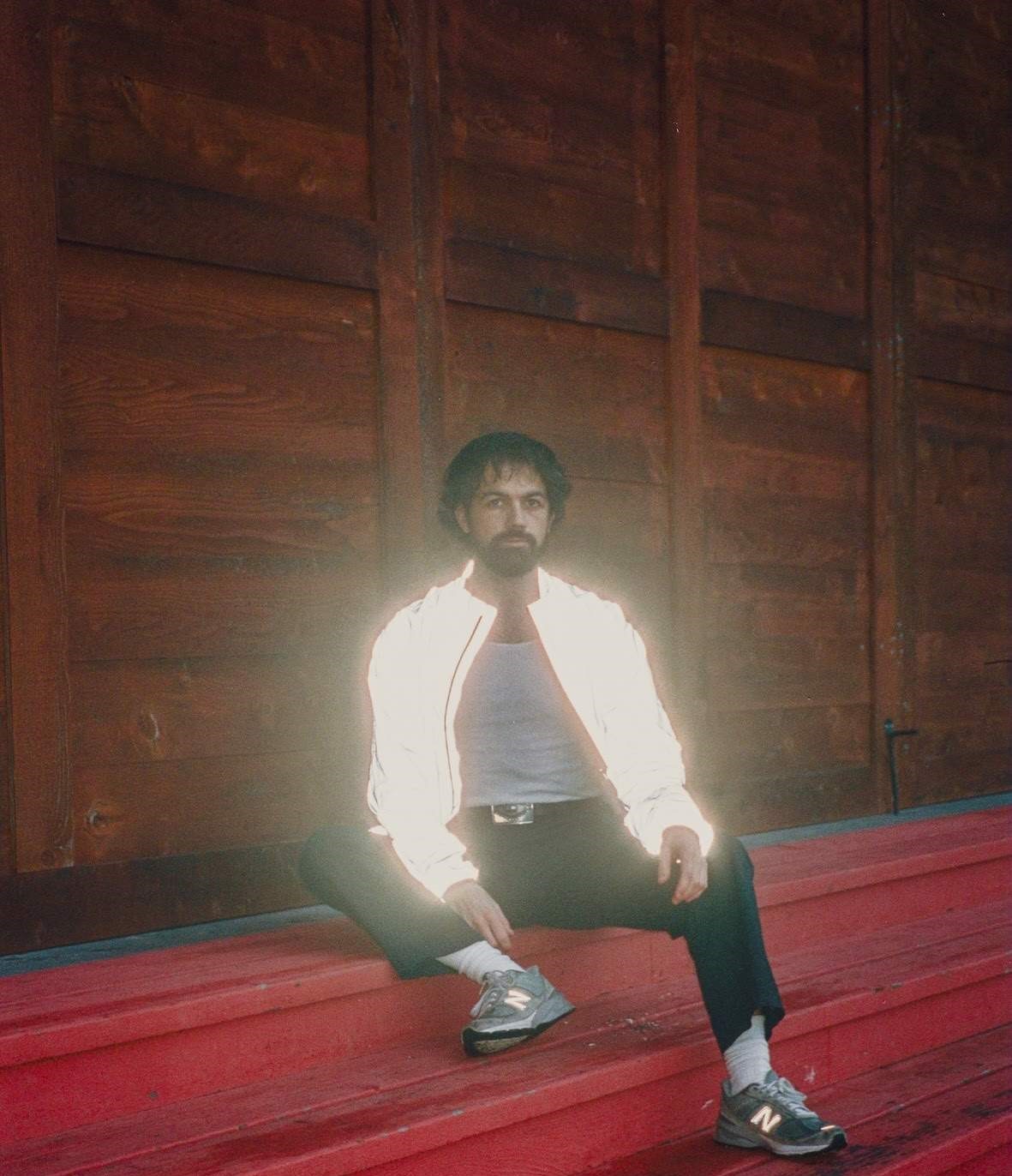Bloodbirds interview with Brooke Tuley, Mike Tuley and Anna St. Louis
© Michael Boles
While some people might know Mike Tuley from
some of his other musical endeavors, even others including his wife Brooke, in
my humble opinion Bloodbirds stands head and shoulders above the rest. Coming from a diverse background the trio
slathers feedback, fuzz, distortion and good old fashioned rock’n’roll with a
disturbingly effective manic pop-like underbelly. The result is a vibrant shimmering cloud of
fuzzy chords, understated drums and pounding bass lines peering from a dark
brooding psychedelic haze. One thing
that strikes you about the music right away is the stripped down nature of the
music, it sounds like some of the tightest and most precise recordings I’ve
heard from a garage band, especially one with such a head-strong DIY mentality,
in just about forever. Having self-released
three previous tapes Bloodbirds’ debut LP Psychic Surgery is getting ready to
sell out but had definitely piqued my interest.
I needed to find out what was going on.
Bloodbirds had kind of fallen out of the sky for me, not coming from any
recommendation but rather a delightfully lucky internet find. Was there going to be a new album any time
soon? Might there be a single or EP to
hold me over while waiting for the afore mentioned, sure to be masterpiece, as it
was being recorded? I tracked down,
Mike, Brooke and Anna and mercifully managed to get the answers I was looking
for! What you don’t think I’m going to
tell you in the introduction do you? If
you’re half as interested as I am keep reading and have your special decoder
rings ready to decipher these important messages!
some of his other musical endeavors, even others including his wife Brooke, in
my humble opinion Bloodbirds stands head and shoulders above the rest. Coming from a diverse background the trio
slathers feedback, fuzz, distortion and good old fashioned rock’n’roll with a
disturbingly effective manic pop-like underbelly. The result is a vibrant shimmering cloud of
fuzzy chords, understated drums and pounding bass lines peering from a dark
brooding psychedelic haze. One thing
that strikes you about the music right away is the stripped down nature of the
music, it sounds like some of the tightest and most precise recordings I’ve
heard from a garage band, especially one with such a head-strong DIY mentality,
in just about forever. Having self-released
three previous tapes Bloodbirds’ debut LP Psychic Surgery is getting ready to
sell out but had definitely piqued my interest.
I needed to find out what was going on.
Bloodbirds had kind of fallen out of the sky for me, not coming from any
recommendation but rather a delightfully lucky internet find. Was there going to be a new album any time
soon? Might there be a single or EP to
hold me over while waiting for the afore mentioned, sure to be masterpiece, as it
was being recorded? I tracked down,
Mike, Brooke and Anna and mercifully managed to get the answers I was looking
for! What you don’t think I’m going to
tell you in the introduction do you? If
you’re half as interested as I am keep reading and have your special decoder
rings ready to decipher these important messages!
Listen
while you read at: http://bloodbirds.bandcamp.com/
while you read at: http://bloodbirds.bandcamp.com/
What’s the band’s lineup? Is this
your original lineup or have you gone through some changes since you first
started?
your original lineup or have you gone through some changes since you first
started?
Brooke:
When we got started practicing Mike was on drums, I was on guitar and
Anna on bass. That lineup lasted about
an hour. See, we set the drums up in the
living room and I started tapping around on them, Mike picked up the guitar,
and Anna followed in. We wrote our first
song that day, called Revolver.
When we got started practicing Mike was on drums, I was on guitar and
Anna on bass. That lineup lasted about
an hour. See, we set the drums up in the
living room and I started tapping around on them, Mike picked up the guitar,
and Anna followed in. We wrote our first
song that day, called Revolver.
I
know that Mike and Brooke are married.
Have you played in bands together previously?
know that Mike and Brooke are married.
Have you played in bands together previously?
Brooke:
Yeah, we’ve always had a musical connection. When I was still in High School my band
Basement Disasters played with Mike’s band, The Short Bus Kids up in Lawrence,
Kansas at the Pirate House. But, the
first time I met Mike was when my girlfriend and I went to see his band play a
benefit concert at a Wal-Mart way out in Olathe. We were part of the same scene, but wouldn’t
know each other until several years later when he would come to see shows at
the Rainbow House where I lived. I was
nineteen and he was twenty-three when he asked me to join his new band, Ad
Astra Per Aspera. We did that for seven
years. After the other Ad Astra Per
Aspera members moved away we formed Hairy Belafonte with a bunch of our
friends. The Ad Astra Arkestra came
next.
Yeah, we’ve always had a musical connection. When I was still in High School my band
Basement Disasters played with Mike’s band, The Short Bus Kids up in Lawrence,
Kansas at the Pirate House. But, the
first time I met Mike was when my girlfriend and I went to see his band play a
benefit concert at a Wal-Mart way out in Olathe. We were part of the same scene, but wouldn’t
know each other until several years later when he would come to see shows at
the Rainbow House where I lived. I was
nineteen and he was twenty-three when he asked me to join his new band, Ad
Astra Per Aspera. We did that for seven
years. After the other Ad Astra Per
Aspera members moved away we formed Hairy Belafonte with a bunch of our
friends. The Ad Astra Arkestra came
next.
What’s the best and the worst thing about being in a band with your
spouse? Anna what’s it like being in a
band with a married couple?
spouse? Anna what’s it like being in a
band with a married couple?
Mike:
It’s positive for me. We get to
travel together and work on projects together.
I think when we squabble it’s stressful to the band dynamic for sure
because it’s not always as simple as a normal band disagreement. I’m sure that’s a bummer for Anna. But it’s pretty rare.
It’s positive for me. We get to
travel together and work on projects together.
I think when we squabble it’s stressful to the band dynamic for sure
because it’s not always as simple as a normal band disagreement. I’m sure that’s a bummer for Anna. But it’s pretty rare.
Brooke:
The best is the struggle toward an ideological convergence. When he plays guitar I get to know exactly
what he’s up against. I mean, it’s how
we relate. There’s a deep down synchronization
to writing and performing together.
The best is the struggle toward an ideological convergence. When he plays guitar I get to know exactly
what he’s up against. I mean, it’s how
we relate. There’s a deep down synchronization
to writing and performing together.
Anna: I
love it. Individually, they’re two of my
closest friends. As a couple, they have
a strong musical connection and are eager to create and communicate with one
another. I benefit from this connection! They also are easy to hang out with because
they’re usually already together.
love it. Individually, they’re two of my
closest friends. As a couple, they have
a strong musical connection and are eager to create and communicate with one
another. I benefit from this connection! They also are easy to hang out with because
they’re usually already together.
I
know Mike’s been in a lot of band’s before, are any of you in any other bands
at this point? Have you released any
music with anyone else? If so can you
tell us about it? It’s come pretty
common place for people to be in several bands at one point these days and I
love playing musical connect the dots!
know Mike’s been in a lot of band’s before, are any of you in any other bands
at this point? Have you released any
music with anyone else? If so can you
tell us about it? It’s come pretty
common place for people to be in several bands at one point these days and I
love playing musical connect the dots!
Brooke:
I write and record songs at home and play them for my mom. The most recent one became a Bloodbirds’ song
called Old Believers. Anna and I sing it
together. We played it once, at our
record release show at Lovegarden a few months ago.
I write and record songs at home and play them for my mom. The most recent one became a Bloodbirds’ song
called Old Believers. Anna and I sing it
together. We played it once, at our
record release show at Lovegarden a few months ago.
Anna: I
play in a band called Torben with two other close friends. It’s loud and heavy.
play in a band called Torben with two other close friends. It’s loud and heavy.
Did
you grow up in musical households? Were
your parents or any of your relatives musicians or extremely interested in
music?
you grow up in musical households? Were
your parents or any of your relatives musicians or extremely interested in
music?
Mike:
Not really, my parents both sold most of their records in a garage sale
when I was a kid. What was left over
was mostly comedy records and Christmas music.
I loved the turntable, so I listened to a lot of Christmas music, Bill
Cosby records and recordings of the moon landing.
Not really, my parents both sold most of their records in a garage sale
when I was a kid. What was left over
was mostly comedy records and Christmas music.
I loved the turntable, so I listened to a lot of Christmas music, Bill
Cosby records and recordings of the moon landing.
Brooke:
Quite the opposite. My mom kept
our apartment quiet. I mean so quiet I
would hide out in my closet with my bass plugged in, but the volume on less
than one; the headphone jack never worked.
It’s not that she was discouraging me.
It’s just that noises bothered her, especially a teenage girl playing
along to the Sex Pistols or to Crass.
Quite the opposite. My mom kept
our apartment quiet. I mean so quiet I
would hide out in my closet with my bass plugged in, but the volume on less
than one; the headphone jack never worked.
It’s not that she was discouraging me.
It’s just that noises bothered her, especially a teenage girl playing
along to the Sex Pistols or to Crass.
Anna:
My step-dad had a pretty good music collection and I learned a lot from
him. He introduced me to lots of
60’s/70’s pop and rock music. I have him
to blame for my Neil Young obsession.
Actually, I guess I really only have Neil Young to blame for that.
My step-dad had a pretty good music collection and I learned a lot from
him. He introduced me to lots of
60’s/70’s pop and rock music. I have him
to blame for my Neil Young obsession.
Actually, I guess I really only have Neil Young to blame for that.
How
were you first introduced to music? When
did you decide that you wanted to start writing/making your own music?
were you first introduced to music? When
did you decide that you wanted to start writing/making your own music?
Mike: I
saw the movie La Bamba when it came out.
I was about nine-years old. I got
really stoked and starting miming along to records in my room. I also wrote weird little songs about the
Terminator on my Casio keyboard as a kid.
I found a tape of that recently.
My band was also called The Terminators.
saw the movie La Bamba when it came out.
I was about nine-years old. I got
really stoked and starting miming along to records in my room. I also wrote weird little songs about the
Terminator on my Casio keyboard as a kid.
I found a tape of that recently.
My band was also called The Terminators.
Brooke:
The first man I ever loved was John Lennon. My mom had a record of his, the one where
he’s sitting cross-legged in a black sweater.
I would lie on the floor for hours making connections between the man on
the cover and songs like Imagine. For me,
the attraction was the ability to express ideas. What got me hooked though was going to punk
shows. It was a way out, but really it
was a way in.
The first man I ever loved was John Lennon. My mom had a record of his, the one where
he’s sitting cross-legged in a black sweater.
I would lie on the floor for hours making connections between the man on
the cover and songs like Imagine. For me,
the attraction was the ability to express ideas. What got me hooked though was going to punk
shows. It was a way out, but really it
was a way in.
Anna: I
started making my own music shortly after I started going to local punk
shows. All my friends were in bands and
I wanted a part of the fun. The older I
got, the more serious it became for me.
started making my own music shortly after I started going to local punk
shows. All my friends were in bands and
I wanted a part of the fun. The older I
got, the more serious it became for me.
Where are you originally from?
Mike:
Kansas City.
Kansas City.
Anna:
Kansas City.
Kansas City.
Where’s the band currently located?
Anna: Kansas City, Lawrence, Westwood, the
pool…
pool…
How
would you describe the local music scene where you are at now?
would you describe the local music scene where you are at now?
Mike:
For me, my favorite Kansas City bands have almost always been
underground. Right now, I’m working on a
record for some buds in the band Nature Boys.
The Conquerors and Lazy are a couple others I’m into.
For me, my favorite Kansas City bands have almost always been
underground. Right now, I’m working on a
record for some buds in the band Nature Boys.
The Conquerors and Lazy are a couple others I’m into.
Anna: Good.
Are
you very involved in that scene?
you very involved in that scene?
Mike:
I’m mostly involved in recording local bands. I don’t book many shows anymore.
I’m mostly involved in recording local bands. I don’t book many shows anymore.
Has
it played a large role in the history, sound or evolution of Bloodbirds?
it played a large role in the history, sound or evolution of Bloodbirds?
Anna:
Not really.
Not really.
Mike:
Not really. Bloodbirds comes from
mutual interests the three of us have.
Not really. Bloodbirds comes from
mutual interests the three of us have.
There’s a lot of really interesting stuff hidden just underneath your
prevailing sound, I’m curious who your musical influences are? What about the band as a whole rather than
individuals?
prevailing sound, I’m curious who your musical influences are? What about the band as a whole rather than
individuals?
Anna:
There’s a lot of overlap in our musical interests. I’d say the main bands that we listen to
together and get inspired to play together, would be Velvet Underground, Spacemen
3 and Can.
There’s a lot of overlap in our musical interests. I’d say the main bands that we listen to
together and get inspired to play together, would be Velvet Underground, Spacemen
3 and Can.
Tell
us about Bloodbirds’ songwriting process.
Is there someone who comes to the rest of the band with an idea, a riff
or something, and then finishes it out with the rest of the band or is there a
lot of jamming and exploring ideas with one another?
us about Bloodbirds’ songwriting process.
Is there someone who comes to the rest of the band with an idea, a riff
or something, and then finishes it out with the rest of the band or is there a
lot of jamming and exploring ideas with one another?
Mike:
All jammin’ all the time. We record
it all, sift through it, and pick out the shit we want to form into songs. Most of the time the songs are already formed
by the jam vocal melody, any kind of verse or chorus situation, etcetera, is
decided by the jam.
All jammin’ all the time. We record
it all, sift through it, and pick out the shit we want to form into songs. Most of the time the songs are already formed
by the jam vocal melody, any kind of verse or chorus situation, etcetera, is
decided by the jam.
Anna: Lots of jamming at practice, recording
it, and refining it later. Sometimes
it’s a couple of weeks before we take a good listen to practice
recordings… They are either met with
total bewilderment/embarrassment, or at other times we’re quite impressed with
our drunken selves.
it, and refining it later. Sometimes
it’s a couple of weeks before we take a good listen to practice
recordings… They are either met with
total bewilderment/embarrassment, or at other times we’re quite impressed with
our drunken selves.
What
about the recording process? Do you do a
lot of preparatory work before heading into the studio or do you try and play
it more off the cuff?
about the recording process? Do you do a
lot of preparatory work before heading into the studio or do you try and play
it more off the cuff?
Anna:
Recording is good for us because it forces us to give structure to our
material. We have the tendency to
over-do it without time restraints.
Recording is good for us because it forces us to give structure to our
material. We have the tendency to
over-do it without time restraints.
Do
you enjoy recording? Some people love it
other people would rather leap out of a tall building than go into a studio
ha-ha!
you enjoy recording? Some people love it
other people would rather leap out of a tall building than go into a studio
ha-ha!
Anna:
It can be tedious and frustrating, but I kind of like the torture. I would rather record than leap out of a tall
building.
It can be tedious and frustrating, but I kind of like the torture. I would rather record than leap out of a tall
building.
Mike: I
love recording. Always have. I think it’s a really creative process and I
like to indulge in a lot of sonic experiments.
Most of which don’t make it to the final record.
love recording. Always have. I think it’s a really creative process and I
like to indulge in a lot of sonic experiments.
Most of which don’t make it to the final record.
Let’s talk about Night Recordings your first demo tape. When was that recorded? Where was it recorded at? Who recorded it? What kind of equipment was used?
Mike:
We recorded that in November 2011 at our old practice cabin. We miss that place. I set up and ran the recording
equipment. We used 8 microphones and
tracked it on a computer.
We recorded that in November 2011 at our old practice cabin. We miss that place. I set up and ran the recording
equipment. We used 8 microphones and
tracked it on a computer.
Was
that release limited? Who released it
and when was that?
that release limited? Who released it
and when was that?
Mike:
We’ve self-released everything thus far.
I don’t think we’d turn anyone down, but we definitely like to do things
our way, including the number of tapes duplicated or records pressed. I think we made one-hundred copies of Night
Recordings on cassette. I dubbed them
myself, one at a time to make sure they sounded as good as possible. I hate the sound of most tape duplicating
machines. They sound like shit. If you’re going to all the trouble to record
and mix some music and get it just how you want it, why fuck it up by cutting
corners in the dubbing process? That’s
just fucking lazy.
We’ve self-released everything thus far.
I don’t think we’d turn anyone down, but we definitely like to do things
our way, including the number of tapes duplicated or records pressed. I think we made one-hundred copies of Night
Recordings on cassette. I dubbed them
myself, one at a time to make sure they sounded as good as possible. I hate the sound of most tape duplicating
machines. They sound like shit. If you’re going to all the trouble to record
and mix some music and get it just how you want it, why fuck it up by cutting
corners in the dubbing process? That’s
just fucking lazy.
The
second demo tape DUKH came out in February of 2012, was the recording of that
album much different than the session(s) for Night Recordings? Was that release limited and who released it?
second demo tape DUKH came out in February of 2012, was the recording of that
album much different than the session(s) for Night Recordings? Was that release limited and who released it?
Mike:
DUKH was recorded at our new practice space, which we initially dubbed
the “worst place in the world” because it lacked all the charm of our
practice cabin. It’s a place that used
to be a retirement home and we were put off at first. It’s has an abandoned-hospital vibe. It was recorded in January during a really
cold spell, and our gear kept fucking up.
Listening to it now, I can definitely hear the frustration. We ditched a couple songs from that session
and brought in Revolver from the practice cabin sessions. We thought it helped balance it out more.
DUKH was recorded at our new practice space, which we initially dubbed
the “worst place in the world” because it lacked all the charm of our
practice cabin. It’s a place that used
to be a retirement home and we were put off at first. It’s has an abandoned-hospital vibe. It was recorded in January during a really
cold spell, and our gear kept fucking up.
Listening to it now, I can definitely hear the frustration. We ditched a couple songs from that session
and brought in Revolver from the practice cabin sessions. We thought it helped balance it out more.
Demo III was released on cassette in April of this year (2013). What about the recording of that album? When was it recorded? Where was it recorded? Who recorded it? What kind of equipment was used?
Mike:
Demo III was recorded at the Worst Place in the World in late
March. I recorded it. We booked a lot of shows at the beginning of
this year, so we were practicing and jamming a lot. We wanted to get a few of the newer songs out
quickly, so we made another cassette / digital EP.
Demo III was recorded at the Worst Place in the World in late
March. I recorded it. We booked a lot of shows at the beginning of
this year, so we were practicing and jamming a lot. We wanted to get a few of the newer songs out
quickly, so we made another cassette / digital EP.
Was
Demo III a limited release? Is that
album still in print?
Demo III a limited release? Is that
album still in print?
Mike:
Yeah, I think we only made fifty copies of Demo III, it’s mostly
gone. It’s available on Bandcamp as a
digital download still.
Yeah, I think we only made fifty copies of Demo III, it’s mostly
gone. It’s available on Bandcamp as a
digital download still.
Why
all cassette releases up until that point?
There are a lot of release mediums out there available to musicians
today and I’m always curious to hear why musicians choose the particular ones
that they do.
all cassette releases up until that point?
There are a lot of release mediums out there available to musicians
today and I’m always curious to hear why musicians choose the particular ones
that they do.
Mike: I
grew up putting out tapes in the early 90’s.
I remember being stoked in High School when my band finally got our
music on CD. As tedious as it can be, I
really do like the process of dubbing tapes.
When I dub the tapes, I saturate the sound a bit, which makes it sound
crunchier than it would if I just burned a bunch of CDs from iTunes. The way a band records, the way their
releases sound and the way people interact with your music are almost as
important as the music itself. Bands
that understand this and unify their aesthetic with their sound usually present
a more cohesive release that translates better and helps listeners identify
with the band and the band’s intentions.
I think the ease of iPods and Mp3’s makes music more disposable. It degrades the ritual of listening to music
and it becomes more of a soundtrack than a focus; background music.
grew up putting out tapes in the early 90’s.
I remember being stoked in High School when my band finally got our
music on CD. As tedious as it can be, I
really do like the process of dubbing tapes.
When I dub the tapes, I saturate the sound a bit, which makes it sound
crunchier than it would if I just burned a bunch of CDs from iTunes. The way a band records, the way their
releases sound and the way people interact with your music are almost as
important as the music itself. Bands
that understand this and unify their aesthetic with their sound usually present
a more cohesive release that translates better and helps listeners identify
with the band and the band’s intentions.
I think the ease of iPods and Mp3’s makes music more disposable. It degrades the ritual of listening to music
and it becomes more of a soundtrack than a focus; background music.
You
posted several cover songs and jams from practices on your Bandcamp page some
of which are still up and others which are gone. Are there any plans for that material? Is it perhaps going to be used in an upcoming
release or made available via a digital source like iTunes or Bandcamp again?
posted several cover songs and jams from practices on your Bandcamp page some
of which are still up and others which are gone. Are there any plans for that material? Is it perhaps going to be used in an upcoming
release or made available via a digital source like iTunes or Bandcamp again?
Mike: I
dunno. We’ve covered a bunch of
songs. We record some because we like
our version or because sometimes we get stuck during the recording process and
doing a cover can jump-start you or reinvigorate you.
dunno. We’ve covered a bunch of
songs. We record some because we like
our version or because sometimes we get stuck during the recording process and
doing a cover can jump-start you or reinvigorate you.
Psychic Surgery, released in January of 2013, was your first vinyl
release. Where was it recorded? Who recorded it? When was it recorded? What kind of equipment?
release. Where was it recorded? Who recorded it? When was it recorded? What kind of equipment?
Mike:
We recorded Psychic Surgery in June 2012 at Junior’s Motel in Otho,
Iowa. It’s a studio out on a farm run by
Kirk Kaufmann who’s been making records there since the 1970’s. He has a couple of 2″ 24-track
tape-machines, a MCI 24-channel mixer, plus sweet old compressors and
mics. I love working with Kirk, I’ve
been recording stuff there since I was sixteen, so for about
seventeen-years. We dumped the tracks
off tape to computer and did the rest of the overdubs and mixing back in Kansas
City. I mixed the record last fall at
home.
We recorded Psychic Surgery in June 2012 at Junior’s Motel in Otho,
Iowa. It’s a studio out on a farm run by
Kirk Kaufmann who’s been making records there since the 1970’s. He has a couple of 2″ 24-track
tape-machines, a MCI 24-channel mixer, plus sweet old compressors and
mics. I love working with Kirk, I’ve
been recording stuff there since I was sixteen, so for about
seventeen-years. We dumped the tracks
off tape to computer and did the rest of the overdubs and mixing back in Kansas
City. I mixed the record last fall at
home.
Let’s talk a little bit about the release of that album. Was Psychic Surgery self-released or who put
it out? Is that release limited? If so how limited?
it out? Is that release limited? If so how limited?
Mike:
Psychic Surgery was self-released.
We’re getting pretty close to selling out of the first pressing. We don’t really have any intentions of
repressing it ourselves, but if someone was interested we might be
receptive. We’re mostly interested in making
another full-length recording right now.
Psychic Surgery was self-released.
We’re getting pretty close to selling out of the first pressing. We don’t really have any intentions of
repressing it ourselves, but if someone was interested we might be
receptive. We’re mostly interested in making
another full-length recording right now.
Was
the recording of Psychic Surgery much different than those early demos?
the recording of Psychic Surgery much different than those early demos?
Mike:
We went to a studio and tracked to tape.
We wanted that sound. We recorded
seventeen songs at Junior’s and used nine of those for the record. The others might be put out sometime as an EP
or something. Some we finished, others
still need some overdubs and mixing.
We went to a studio and tracked to tape.
We wanted that sound. We recorded
seventeen songs at Junior’s and used nine of those for the record. The others might be put out sometime as an EP
or something. Some we finished, others
still need some overdubs and mixing.
Has
the recording process changed a lot for you over the last few years? You seem to spend a fair amount of time
recording and have amassed a fairly hefty back catalog at this point. What about the songwriting? Has it changed much at this point?
the recording process changed a lot for you over the last few years? You seem to spend a fair amount of time
recording and have amassed a fairly hefty back catalog at this point. What about the songwriting? Has it changed much at this point?
Mike:
Songwriting has always been open and loose. You know the expression, “fast and
loose”? Well we like to say that we
keep it “slow and loose” when we’re writing songs. Recording is something I do as a part-time
job, so I record in all kinds of situations with all kinds of bands. Junior’s Motel is a familiar and comfortable
place for me, so tracking the record there was really fun.
Songwriting has always been open and loose. You know the expression, “fast and
loose”? Well we like to say that we
keep it “slow and loose” when we’re writing songs. Recording is something I do as a part-time
job, so I record in all kinds of situations with all kinds of bands. Junior’s Motel is a familiar and comfortable
place for me, so tracking the record there was really fun.
© Ailecia
Ruscin
Ruscin
Are
there any plans for a follow-up to Psychic Surgery, maybe a follow-up LP, an EP
or even a single? Any morsels for the
hungry masses like me?
there any plans for a follow-up to Psychic Surgery, maybe a follow-up LP, an EP
or even a single? Any morsels for the
hungry masses like me?
Mike:
Yeah, all of the above. We’ve
been working on new songs since the moment we finished that record. Right now we’re trying to get organized and
pick out the songs for another full-length record, and we’re planning on
releasing a cassette EP on Rainy Road Records out of Omaha sometime later this
summer or in early fall.
Yeah, all of the above. We’ve
been working on new songs since the moment we finished that record. Right now we’re trying to get organized and
pick out the songs for another full-length record, and we’re planning on
releasing a cassette EP on Rainy Road Records out of Omaha sometime later this
summer or in early fall.
Why
the shift from tape to vinyl? Having
done both cassettes and vinyl at this point do you have a preferred medium of
release?
the shift from tape to vinyl? Having
done both cassettes and vinyl at this point do you have a preferred medium of
release?
Mike:
We like vinyl it just takes more money and time to create. If we spend the time in the studio getting
things just so, we’d rather put it out on vinyl. We mostly use cassette releases as a way to
get out newer songs or songs that are a bit strange.
We like vinyl it just takes more money and time to create. If we spend the time in the studio getting
things just so, we’d rather put it out on vinyl. We mostly use cassette releases as a way to
get out newer songs or songs that are a bit strange.
Where’s the best place for our U.S. readers to buy copies of Bloodbirds’
music?
music?
Mike:
You can get it straight from us if you’d like, at:
http://shotintheground.blogspot.com/p/releases.html or you can get it through
Permanent Records at:
https://shop.permanentrecordschicago.com/lp-blood-birds-psychic-surgery/dp/76495.
You can get it straight from us if you’d like, at:
http://shotintheground.blogspot.com/p/releases.html or you can get it through
Permanent Records at:
https://shop.permanentrecordschicago.com/lp-blood-birds-psychic-surgery/dp/76495.
With
the recent international postage rate hikes what about our international and
overseas readers?
the recent international postage rate hikes what about our international and
overseas readers?
Mike:
I’d say get it from Permanent Records, in that case they might have some
other stuff you want so you can consolidate packages and save on shipping
costs.
I’d say get it from Permanent Records, in that case they might have some
other stuff you want so you can consolidate packages and save on shipping
costs.
What
are you trying to accomplish as a band in 2013?
are you trying to accomplish as a band in 2013?
Mike:
Well, we self-released our LP and went on a west coast tour in
June. So now we’re coasting for awhile
and working on the next record. Our main
goal at the beginning of the year was to work on our live show, so we booked a
bunch and that helped us refine it a bit.
Well, we self-released our LP and went on a west coast tour in
June. So now we’re coasting for awhile
and working on the next record. Our main
goal at the beginning of the year was to work on our live show, so we booked a
bunch and that helped us refine it a bit.
What
do you have planned as far as touring goes for the rest of the year?
do you have planned as far as touring goes for the rest of the year?
Mike:
Not sure yet. Probably just some
regional Midwest stuff, unless a good offer comes along. We really dig playing in Little Rock at the
White Water Tavern. Hope to make it back
down that way soon.
Not sure yet. Probably just some
regional Midwest stuff, unless a good offer comes along. We really dig playing in Little Rock at the
White Water Tavern. Hope to make it back
down that way soon.
© Lillian Wright Smith
Who
are some of your personal favorite bands that you’ve had the chance to share a
bill with?
are some of your personal favorite bands that you’ve had the chance to share a
bill with?
Mike:
Lorelle Meets the Obsolete. We
loved them, played with them in Los Angeles.
If you have a chance to see them live, do it! They rule.
Lorelle Meets the Obsolete. We
loved them, played with them in Los Angeles.
If you have a chance to see them live, do it! They rule.
© Christopher Good
Do
you have any funny or interesting stories from live shows that you’d like to
share with our readers?
you have any funny or interesting stories from live shows that you’d like to
share with our readers?
Mike:
We made tour like vacation.
That’s the way to do it. We hung
out in the desert, at the Grand Canyon, Big Sur, in the Redwoods, on the
Columbia River, at Little Bighorn, and at the Bandlands. In between we played some rad shows,
especially in the Northwest.
We made tour like vacation.
That’s the way to do it. We hung
out in the desert, at the Grand Canyon, Big Sur, in the Redwoods, on the
Columbia River, at Little Bighorn, and at the Bandlands. In between we played some rad shows,
especially in the Northwest.
I
have an addiction and I don’t always like to talk about it. I am absolutely obsessed with physical
music. Having something to hold in your
hands, artwork to look at and liner notes to read, it all serves for an
interactive, and to me, much more complete listening experience. Do you have any such connection with physical
releases?
have an addiction and I don’t always like to talk about it. I am absolutely obsessed with physical
music. Having something to hold in your
hands, artwork to look at and liner notes to read, it all serves for an
interactive, and to me, much more complete listening experience. Do you have any such connection with physical
releases?
Mike: Yeah
dude, for sure. That’s all part of the
ritual of listening to music that I referenced earlier. I think it’s typical of people who are into
underground music. They want a physical
connection with it. Some people just
don’t get it or don’t care, that’s fine.
I do. I have an iPod and I use it
all the time. I’m not
anti-technology. But the iPod, while a
very practical way to transport large collections of music, completely lacks
that charm. It super-imposes its own
character above everything else, which dilutes the connection to the
music. It devalues music because it’s
easy to skip, delete, or replace songs.
I know that’s the idea, but I think it contributes to this sense that a
person should always have what they want, when they want it. It dissolves patience and favors the
immediate. I know there are some people
who are super stoked about the design aesthetic of the iPod, and I can
appreciate that, I just don’t care about iPods like I care about records or
books. Growing up with tapes and records,
or even the radio waiting for your favorite jam to come on is fun. The anticipation of the opening chords, the
drum beat, etcetera… The reward was
greater. I think technology makes people
finicky, flakey, impatient, and frustrated.
You can lose yourself.
dude, for sure. That’s all part of the
ritual of listening to music that I referenced earlier. I think it’s typical of people who are into
underground music. They want a physical
connection with it. Some people just
don’t get it or don’t care, that’s fine.
I do. I have an iPod and I use it
all the time. I’m not
anti-technology. But the iPod, while a
very practical way to transport large collections of music, completely lacks
that charm. It super-imposes its own
character above everything else, which dilutes the connection to the
music. It devalues music because it’s
easy to skip, delete, or replace songs.
I know that’s the idea, but I think it contributes to this sense that a
person should always have what they want, when they want it. It dissolves patience and favors the
immediate. I know there are some people
who are super stoked about the design aesthetic of the iPod, and I can
appreciate that, I just don’t care about iPods like I care about records or
books. Growing up with tapes and records,
or even the radio waiting for your favorite jam to come on is fun. The anticipation of the opening chords, the
drum beat, etcetera… The reward was
greater. I think technology makes people
finicky, flakey, impatient, and frustrated.
You can lose yourself.
Do
you have a music collection at all? If
so can you tell us a little bit about it?
you have a music collection at all? If
so can you tell us a little bit about it?
Mike:
Yeah, Brooke and I combined our record collections when we moved in
together. I have a huge CD collection gathering dust at my parent’s house. I’ve digitized most of those so I should just
take them to a show and give them away.
Yeah, Brooke and I combined our record collections when we moved in
together. I have a huge CD collection gathering dust at my parent’s house. I’ve digitized most of those so I should just
take them to a show and give them away.
Right now there’s a pretty wide breadth of music mediums on the market,
cassettes, CDs, digital and vinyl! Do
you have a preferred medium for music that you purchase?
cassettes, CDs, digital and vinyl! Do
you have a preferred medium for music that you purchase?
Mike:
Vinyl. I grew up playing my
parents records, and it’s always been my favorite.
Vinyl. I grew up playing my
parents records, and it’s always been my favorite.
There are two general ways of viewing the digital music era. One where people are rampantly downloading
albums for free, destroying the music industry as we know it and turning music
into a disposable commodity to be used, discarded and forgotten. While the other argues that it’s simply
leveling the playing field for the independent artists out there willing to put
in the time to promote and keep up an online presence and really compete with
the major labels. As an artist in the
reign of the digital era what is your take on digital music and distribution?
albums for free, destroying the music industry as we know it and turning music
into a disposable commodity to be used, discarded and forgotten. While the other argues that it’s simply
leveling the playing field for the independent artists out there willing to put
in the time to promote and keep up an online presence and really compete with
the major labels. As an artist in the
reign of the digital era what is your take on digital music and distribution?
Mike:
If people wanna take my music for free, I’m fine with it. I don’t think it’s so different from when
people make mix-tapes for each other. I used to record songs off the radio on
my cassette boombox. I’d listen to those over and over again. I think it’s just easier to get music for
free now. It’s definitely led to people
having a warped and cavalier attitude towards the music they consume. I had a dude tell me once after a show, that
he wouldn’t buy our record. That if our
record was any good he’d be able to find a torrent of our music. I think he thought he was coming across as a
badass or savvy or something, but he just came across as a brat. There are still a lot of folks out there who
support DIY bands and buy records.
If people wanna take my music for free, I’m fine with it. I don’t think it’s so different from when
people make mix-tapes for each other. I used to record songs off the radio on
my cassette boombox. I’d listen to those over and over again. I think it’s just easier to get music for
free now. It’s definitely led to people
having a warped and cavalier attitude towards the music they consume. I had a dude tell me once after a show, that
he wouldn’t buy our record. That if our
record was any good he’d be able to find a torrent of our music. I think he thought he was coming across as a
badass or savvy or something, but he just came across as a brat. There are still a lot of folks out there who
support DIY bands and buy records.
As I
said before I love music, as you might imagine with my job, and I try to keep
up with as much good music as is humanely possible. Who should I be listening to from your local
scene or area that I might not have heard of?
said before I love music, as you might imagine with my job, and I try to keep
up with as much good music as is humanely possible. Who should I be listening to from your local
scene or area that I might not have heard of?
Mike:
If you haven’t heard Drakkar Sauna from Lawrence, Kansas, give a listen
to some of their albums. I like 20009,
Drakansassauna, and Jabraham Lincoln, I like the new Lazy record and the new
Nature Boys record I’m working on has great songs. Also our homies in Peace Warriors, and
Torben!
If you haven’t heard Drakkar Sauna from Lawrence, Kansas, give a listen
to some of their albums. I like 20009,
Drakansassauna, and Jabraham Lincoln, I like the new Lazy record and the new
Nature Boys record I’m working on has great songs. Also our homies in Peace Warriors, and
Torben!
What
about nationally and internationally?
about nationally and internationally?
Mike:
I’m tellin’ ya, check out Lorelle Meets the Obsolete from Guadalajara,
Mexico; rad band.
I’m tellin’ ya, check out Lorelle Meets the Obsolete from Guadalajara,
Mexico; rad band.
DISCOGRAPHY
(2011)
Bloodbirds – Night Recordings – digital, Cassette Tape – Self-Released
(Limited to 100 copies)
Bloodbirds – Night Recordings – digital, Cassette Tape – Self-Released
(Limited to 100 copies)
(2011)
Bloodbirds – DUKH – digital, Cassette Tape – Self-Released (Limited
Edition)
Bloodbirds – DUKH – digital, Cassette Tape – Self-Released (Limited
Edition)
(2012)
Bloodbirds – Covers – digital – Self-Released (Bandcamp)
Bloodbirds – Covers – digital – Self-Released (Bandcamp)
(2013)
Bloodbirds – Demo III – digital, Cassette Tape – Self-Released (Limited
to 50 copies)
Bloodbirds – Demo III – digital, Cassette Tape – Self-Released (Limited
to 50 copies)
(2013)
Bloodbirds – Psychic Surgery – digital, 12” – Self-Released (Limited to
one pressing)
Bloodbirds – Psychic Surgery – digital, 12” – Self-Released (Limited to
one pressing)
Interview made by Roman Rathert/2013
© Copyright
http://psychedelicbaby.blogspot.com/2013
http://psychedelicbaby.blogspot.com/2013
Array

